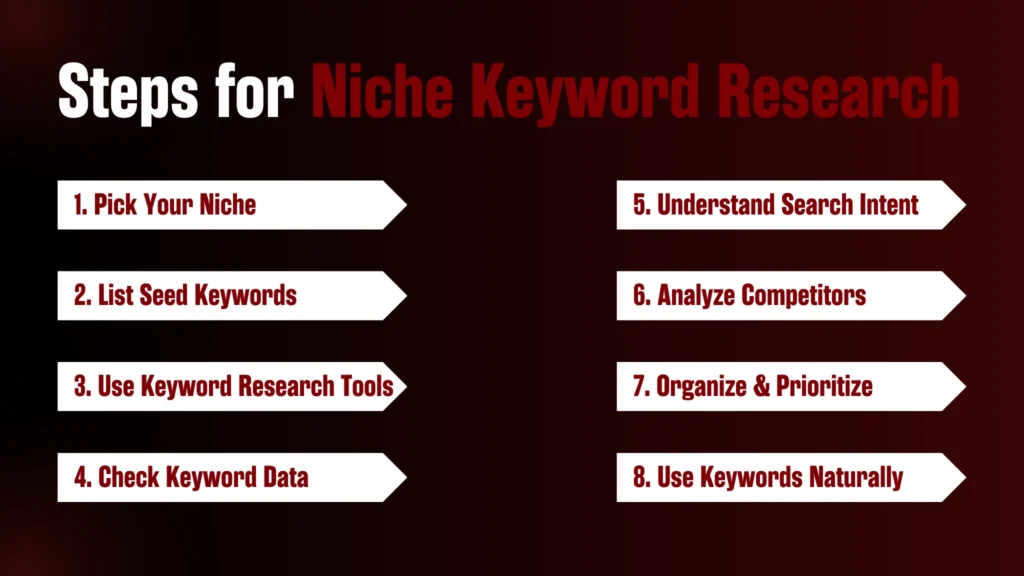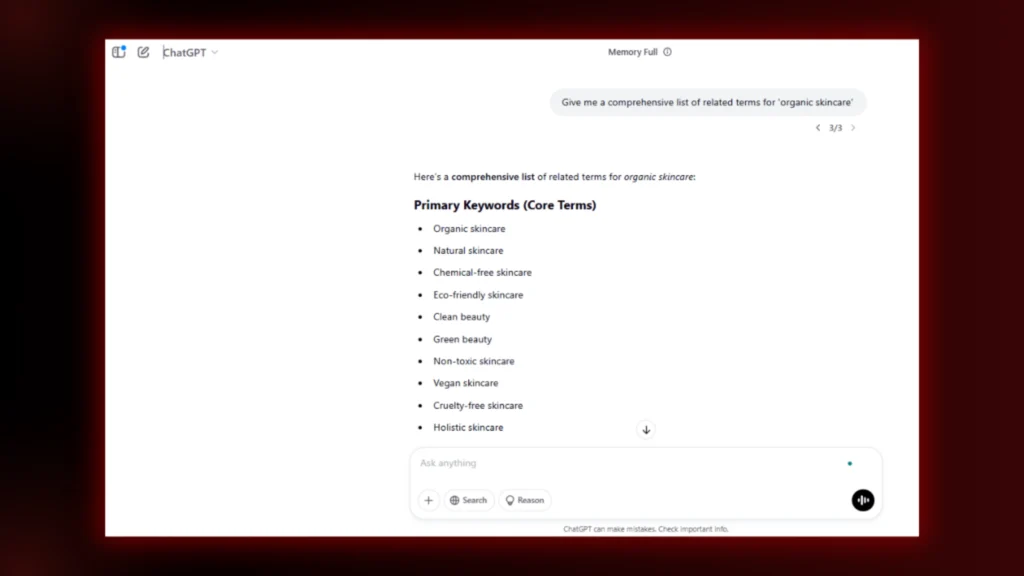Drowning in search results? It’s really frustrating when your content gets buried under big brands. The trick to standing out? Niche keywords.
Instead of fighting for broad, high-competition terms, focus on specific, low-competition keywords that attract the right audience.
- Less Effort
- Better Rankings
- More Conversions
Sounds good, right? But how do you find these hidden gems? We are going to discuss that in this blog post.
We’ll walk you through simple steps, powerful tools, and smart strategies to do niche keyword research. Ready to get noticed? Let’s get started!
Understanding Niche Keywords
What Are Niche Keywords?
Niche keywords are specific, targeted search terms. They focus on a small but highly interested audience. Unlike broad keywords, they have lower competition and higher conversion rates.
Niche vs. Broad Keywords
- Broad keywords: High search volume, high competition, less specific (e.g., “shoes”)
- Niche keywords: Lower search volume, low competition, highly specific (e.g., “handmade leather boots for winter”)
Broad keywords attract more traffic but less engagement. Niche keywords bring fewer visitors but more buyers.
Examples in Different Industries
- Fitness: “beginner yoga for back pain” vs. “yoga”
- Tech: “best budget gaming laptop under $500” vs. “laptop”
- Beauty: “organic shampoo for curly hair” vs. “shampoo”
Niche keywords help you target the right people, not just more people.
Important Factors to Consider in Niche Keyword Research

Here are certain things that you should consider when doing niche keyword research. Have a look:
Your Audience
Who are you targeting? Understanding their needs, interests, and problems is key. Ask yourself:
- What are they searching for?
- What solutions do they need?
- How do they talk about their problems?
Use forums, social media, and customer reviews to find real questions and pain points.
Competitors
Look at businesses in your niche. See what’s working for them. Analyze:
- Their top-ranking keywords
- The content they create
- Gaps they’re missing
Use tools like Ahrefs, SEMrush, or Ubersuggest to dig deeper. Find untapped opportunities.
Market Demand & Profitability
Not all niches are worth targeting. Before diving in, check:
- Search volume – Are enough people looking for it?
- Competition – Can you compete and rank?
- Monetization potential – Can it bring leads, sales, or ad revenue?
Google Trends, Keyword Planner, and niche forums can help you spot trends before they explode.
Steps for Niche Keyword Research

Below is a list of steps for effective niche keyword research. These steps consistently help in finding valuable keywords that drive real results.
1. Pick Your Niche
Start with a specific topic that excites you. It should have a clear audience with real needs. Look at forums, social media, and reviews to see what people are discussing.
Please pay attention to their questions and struggles. The goal is to find out what they need and how you can help. A strong niche makes keyword research easier.
2. List Seed Keywords
Once you have your niche in place, think of simple words related to your niche. These are your starting points. There are different ways to find them.
One easy method is using AI. Just give a prompt like, “Give me a list of related terms for ‘organic skincare.”

You can also use Google Autocomplete, Reddit, and Quora to find common terms. Explore blogs and competitor websites, too. Your goal is to collect as many keyword ideas as possible.

You can get multiple keyword ideas through these methods. It is recommended that you list all the terms you find during this process on a sheet.
3. Use Keyword Research Tools
Now, it’s time to dig deeper. Use Google Keyword Planner for search volume and competition. Ahrefs & SEMrush analyze what keywords competitors rank for.
Ubersuggest & KeywordTool.io help you discover related terms. Google Trends shows keyword popularity over time. AnswerThePublic reveals common questions people ask. These tools help you find valuable keywords with real potential.
4. Check Keyword Data
Not every keyword is worth targeting. You need to check a few things:
- Search Volume: How many people search for it?
- Keyword Difficulty: How hard is it to rank?
- CPC (Cost Per Click): Does it have money-making potential?
Find keywords with
- Good Search Volume
- Low Competition.
Avoid picking broad, high-competition keywords, especially if you’re just starting. Focus on words you can rank for.

5. Understand Search Intent
Why are people searching for this keyword? Are they looking for information, a product, or a solution?
- Informational – “How to lose weight fast” (they want knowledge)
- Transactional – “Best protein powder to buy” (they’re ready to purchase)
- Navigational – “Nike official website” (they know what they want)
Your content should match search intent. If someone is looking for information, don’t push a product right away. If they’re ready to buy, guide them to the best option.
6. Analyze Competitors
Search your chosen keywords on Google. Look at the top-ranking pages. It will help you in content creation. Look at:
- What kind of content are they offering?
- How are their articles structured?
Check their headlines, subtopics, and formatting. If you find gaps, like missing details or outdated info—you have an opportunity. Create something better and more useful. You can also use Ahrefs or SEMrush to see what keywords they rank for.

7. Organize & Prioritize
Now, you have a list of potential keywords. Group them into categories, pillars or clusters based on topics. Prioritize the ones that:
- Have high relevance to your niche
- Are easier to rank for (lower difficulty)
- Have good traffic potential.
8. Use Keywords Naturally
Now, it’s time to use your keywords in content. Add them to headlines, subheadings, URLs, and throughout your article.
But don’t overdo it. Always try to write naturally. Google prefers valuable, well-structured content over keyword-stuffed articles. Make sure your keywords flow smoothly within your writing.
Read Blog Post: Affiliate Marketing Keyword Research: Find the Best Keywords
FAQs
1. How do you find niche keywords?
Start with a broad idea. Think about what people might search for. Use Google Keyword Planner, Ahrefs or Ubersuggest to find specifics. Look for low competition and high relevance.
Check what your competitors are ranking for. Check Google trends. Choose keywords that match what your audience needs.
2. What is a niche keyword?
A niche keyword is super specific. Instead of just “skincare” think “organic anti-aging serum for dry skin”. It’s more detailed and targets the right people.
3. How do I find my SEO niche?
Think about what you love or know a lot about. Check if people are searching for it. Check how much competition there is.
Use keyword research tools to find gaps in the market. Try creating content around a few ideas. Go with the one that gets the best response.
4. What is niche research in SEO?
Niche research in SEO is all about finding smaller, less competitive keywords. It helps you focus on a specific audience.
This makes it easier to rank higher on Google. The goal is to stand out in a space where fewer people are competing.
Conclusion
Niche keywords are your secret weapon to stand out in a crowded market. Instead of competing with giants, focus on specific, low-competition terms that attract the right audience.
With the right research, tools and strategy, you can drive real traffic and conversions – without the struggle.
Want to skip the hassle? Let Brand ClickX do the niche keyword research for you. We’ll find the best keywords to help you rank higher and grow faster.



